|
| Key Issues and the Secretary-General's Report |
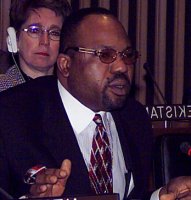 |
 Nigeria,
speaking on behalf of the G-77/China (Part
1) (Part
2)
Nigeria,
speaking on behalf of the G-77/China (Part
1) (Part
2)
The G-77/China said the Secretary-General's
Report addresses elements of relevance to developing countries,
although he noted that the applicability to developing countries
and their state of development still presents problems. He underscored
issues relating to capacity building, the level of understanding
and skill in developing countries, technology transfer and removal
of barriers, financing sustainable energy development, the use of
traditional fuels and the constraints on shifting to other sustainable
energy options. On
renewable energy, he cautioned against conditionalities and time
limits for the introduction of new technologies. Supporting further
research on renewables, he said the results could be mainstreamed
depending on their proven potential
|
 Portugal,
speaking on behalf of the EU
Portugal,
speaking on behalf of the EU
The EU emphasized
the need for structural reforms in the energy sector, including
the elimination of inefficient monopolies, introducing accurate
price signals, and phasing out harmful energy subsidies. He encouraged
the creation of efficient transport systems and the enhancement
of public-private partnerships, and supported good governance
through the increased participation of civil society. He urged
donors to strengthen efforts in meeting the 0.7% GNP targets.
|
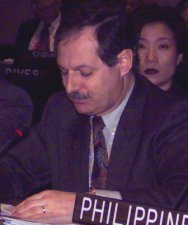 |
|
On advanced
fossil and nuclear fuels technologies, Canada informed
the Group on its development of a knowledge-base on a range of
technologies across industry and other sectors. She said that for
Canada to meet immediate and longer-term energy requirements,
provision needs to be made for nuclear power within a broad energy
mix. On renewable energy, she described its renewable energy
strategy that promotes a mix of renewables driven by market
initiatives, noting that this is reflected in the work of its
international development agency.
|
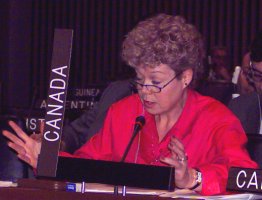 |
|
|
 The
Russian Federation
The
Russian Federation
The Russian
Federation outlined his country's long term national energy
policy objectives of: mobilizing finance and creating an attractive
investment climate; improving nuclear power facilities; gradually
reducing and eliminating subsidies; international cooperation; optimizing
the transport sector; developing renewables; and using cleaner technology.
|
|
|
The UN ECE
emphasized the importance of a regional approach, and highlighted
the potential for significant energy efficiency improvements in
EITs. He argued that energy taxes penalize national economies,
and suggested monitoring the process of market liberalization,
and questioning its compatibility with promoting energy efficiency
and sustainable development. Denmark, responding to the UN ECE,
said it was his country's experience that energy taxes contributed
both to the reduction of CO2 emissions and to the development
of the economy and industrial innovation.
(Listen
to the exchange between Denmark and the ECE)
|
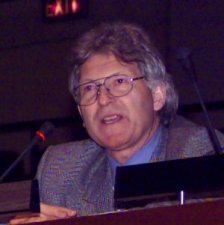 |
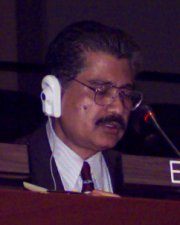 |
|
|
|
The
IUCN expressed concern at the G-77/China's criticism, on Monday,
6 March, of the World Energy Assessment (WEA) report, noting in particular
the Group's emphasis on conventional energy resources and their rejection
of "leap-frogging" to cleaner and more efficient energy sources. The
IUCN said the WEA report clearly demonstrated that a conventional
high technology resource path would be so capital intensive that it
would leave little room for spending on other critical needs in developing
countries. |
|
Reporting
on a recent conference on clean energy, the World Sustainable
Energy Coalition said pollution avoidance is a global task requiring
international coordination. He called on countries to, inter
alia: formulate targets for the adoption of non-polluting technologies,
estimate the investment required for introduction of renewable energy
and implement or extend existing environmental monitoring systems.
On energy related issues in transportation, he commented
on the advantages of natural gas infrastructure because it can be
adapted for biogas
|
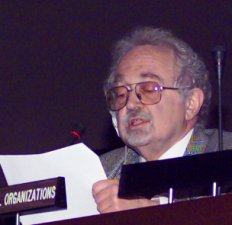 |
|
|
Switzerland
(left) emphasized two key issues: access to energy, especially in
rural areas; and improved energy efficiency through incentives and
institutional support. He emphasized the role of decentralized energy
supply and micro-financing schemes.
Iraq
(right) noted the impediments created by the economic sanctions
to the reconstruction and development of electricity infrastructure
destroyed during the Gulf War.
|
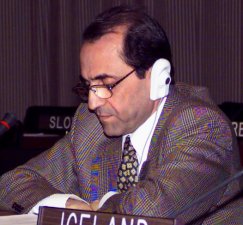 |
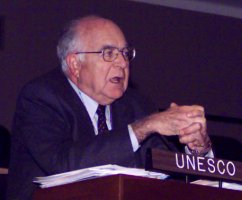 |
UNESCO
outlined its activities to promote solar power, and called on the
CSD to integrate its proposals and activities with existing initiatives.
|
|
The
World Meteorological Organization encouraged the Expert Group
to recognize the importance of the climate-energy relationship,
by including within the appropriate key issues, the need for increased
support for national and international cross-disciplinary activities
that can apply climate information to effective planning, design,
and management strategies throughout the energy sector.
|
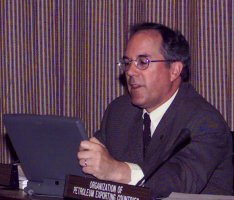 |
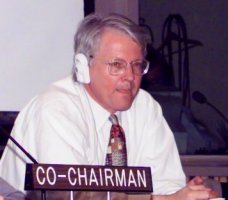 |
Thomas
Johansson, UNDP (left), and Jose Goldemburg (right)
|
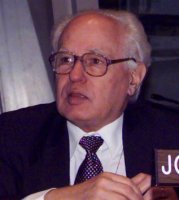 |
|
|
|